The principles of equality and non-discrimination are part of the foundations of the rule of law. As Member States noted in the Declaration of the High-Level Meeting on the Rule of Law, “all persons, institutions and entities, public and private, including the State itself, are accountable to just, fair and equitable laws and are entitled without any discrimination to equal protection of the law”(para. 2). They also dedicated themselves to respect the equal rights of all without distinction as to race, sex, language or religion (para. 3).
The international human rights legal framework contains international instruments to combat specific forms of discrimination, including discrimination against indigenous peoples, migrants, minorities, people with disabilities, discrimination against women, racial and religious discrimination, or discrimination based on sexual orientation and gender identity.
In the Declaration of the High-Level Meeting on the Rule of Law, Member States also recognized the importance of ensuring that women, on the basis of the equality of men and women, fully enjoy the benefits of the rule of law. Member States committed to using law to uphold their equal rights and ensure their full and equal participation, including in institutions of governance and the judicial system, and recommitted to establishing appropriate legal and legislative frameworks to prevent and address all forms of discriminaion and violence against women and to secure their empowerment and full access to justice. UN Women engages in advancing these issues by supporting the UN system in the formulation of policies, global standards and norms, providing technical and financial support to Member States, and forging effective partnerships with civil society. The Declaration notes the importance of the rule of law for the protection of the rights of the child, including legal protection from discrimination, violence, abuse and exploitation, ensuring the best interests of the child in all actions, and recommit to the full implementation of the rights of the child
Relevant Documents and Links
- Resources on discrimination from a human rights perspective
- Special Rapporteur on the rights of indigenous peoples
- Special Rapporteur on the Human Rights of Migrants
- Independent Expert on minority issues
- Special Rapporteur on the Rights of Persons with Disabilities
- Special Rapporteur on violence against women
- Special Rapporteur on contemporary forms of racism, racial discrimination and xenophobia and related intolerance
- Special Rapporteur on freedom of religion or belief
- Combatting discrimination based on sexual orientation and gender identity
- Independent Expert on the enjoyment of human rights by persons with albinism

